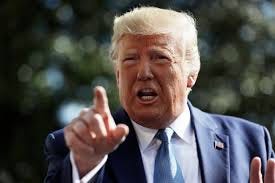President Trump's Dwindling Defenses
President Trump and his supporters have repeatedly retreated to new lines of defense as the scandal surrounding the president’s interactions with Ukraine has continued to unfold. Their responses remind me of those movie scenes where troops defending a castle repeatedly withdraw to a new position further and further inside as the attackers breach yet another wall. And just like those castle troops, the Republicans are rapidly running out of room to maneuver.

"It’s Hearsay!"
The Ukraine scandal was first revealed in a complaint by an anonymous whistleblower. Trump’s initial defense was that the complaint was nothing more than unreliable hearsay and should not be believed. The complaint did contain some reports of what others had said and noted that the whistleblower did not personally witness those events. Some of those statements might be hearsay if they were offered at a trial – but that was never really the point. The complaint was not intended to serve as the full body of evidence against the president, but merely to prompt an investigation. There’s nothing at all improper about investigations being prompted by hearsay reports, anonymous tips, or other information that ultimately might not be admissible at trial. The point is to investigate to see whether that information can be corroborated through other evidence that would be admissible. That's exactly what happened here. The hearsay claim was quickly overtaken by events. The White House released a memo summarizing Trump’s call with Ukrainian president Zelensky that largely confirmed the whistleblower’s allegations. That memo would not be hearsay in a courtroom. Contrary to Trump’s repeated claims that the call was “perfect,” the transcript showed that it was in fact deeply troubling, with the president insisting that Zelensky do him a "favor” by opening investigations concerning Joe Biden and the 2016 election. The investigation in Congress quickly led to multiple witnesses with first-hand knowledge of the president’s attempted shakedown of Ukraine – also not hearsay. Despite laws protecting the whistleblower’s identity – and despite the initial claims that his or her testimony would be worthless hearsay – the president and some of his allies continue to call for the whistleblower to be revealed and to testify. But such calls seem increasingly irrelevant and desperate. This investigation has already confirmed the whistleblower’s allegations and moved far beyond them. There is no need for the whistleblower to testify. Focusing on the whistleblower at this point is like arriving to find a building in flames and worrying about who pulled the fire alarm instead of fighting the blaze.

Gordon Sondland
"There Was No Quid Pro Quo!"
The next line of defense was that there was no quid pro quo. The president and his allies claimed he did not withhold military aid to Ukraine to pressure that government to investigate his political rival, and that the memo of the phone call with Zelensky confirmed it. That defense collapsed pretty quickly when most observers agreed that the memo, coupled with the surrounding circumstances, did indeed demonstrate a quid pro quo. In addition, a parade of witnesses all testified to the existence of a quid pro quo, based not just on the phone call but on other conversations and meetings between Ukrainian officials, Trump's attorney Rudy Giuliani, and Gordon Sondland, Trump’s ambassador to the European Union. Sondland himself confirmed the quid pro quo when he “updated” his original Congressional testimony this week. In the face of such overwhelming evidence, most of Trump’s defenders have realized the “no quid pro quo” claim is unsustainable – although the president himself continues to maintain it. That could make for an interesting conflict in defenses down the road. Republicans may admit there was a quid pro quo but deny it was serious enough to remove the president from office, while the president himself continues to deny the quid pro quo even existed. It's tough to defend someone when he denies the facts essential to your defense.
"It was a GOOD Quid Pro Quo!"
Next came the claim that even if there was a quid pro quo, it was perfectly legitimate. Some noted that the U.S. routinely engages in back-and-forth bargaining with other nations and attach strings to foreign assistance. For example, suppose the president was speaking to the president of Mexico and suggested that more U.S. aid might be forthcoming if Mexico were to step up its efforts to fight internal corruption. You could consider that a quid pro quo, and it would be no problem. In other words, the argument goes, this was all just diplomacy as usual and the country should “get over it.” The problem with this defense is that the “quo” Trump sought here was not a general government policy or action that would benefit U.S. interests but a specific act to help the president’s personal political fortunes. That personal benefit provides the element of corrupt intent that differentiates Trump’s misconduct from routine, legitimate foreign policy. Those making this argument try to claim that Trump was simply interested in fighting corruption, which is a good thing. But considering that the president has shown little interest in encouraging other nations – Russia, for example – to fight internal corruption, it’s laughable to argue that he just happened to develop an overwhelming concern about general corruption in Ukraine. In his call with president Zelensky Trump expressly mentioned Biden, and Rudy Giuliani had been focusing on getting Ukraine to investigate the Bidens for months. The president was not concerned with corruption in general, but with seeking a particular investigation that would damage his political rival. Of course a president can conduct foreign policy that includes negotiating with world leaders concerning policies and actions in the U.S. interest. What he can’t do is leverage the power of his office with the corrupt intent to act not in the national interest but to benefit himself.
"It Was a Failed Crime!"
The next fallback position was: Okay, maybe there was a quid pro quo, and maybe it was bad, but it is not a big deal because it was not successful. Ukraine apparently did not begin the requested investigations of the Bidens, and the military aid was ultimately released (although only after Capitol Hill began asking questions). Fox News commentator Brit Hume recently characterized the events as a “failed crime,” and claimed impeachment would therefore be inappropriate. So maybe the president was trying to do crimes, but in the end he didn’t succeed, so – no harm, no foul. This argument is flat wrong as a matter of criminal law. The crime of bribery is complete with the offer of a corrupt deal – when the public official agrees to be influenced in exchange for something of value. Bribery law does not require that the quid pro quo be consummated. It doesn’t matter if the official act is never actually performed, or if the bribe is never paid. If this were a criminal trial the jury would be instructed that it is not a defense if Ukraine never opened the investigations or if the aid ultimately was delivered anyway. But of course this is not a criminal proceeding. The issue isn’t whether the president’s conduct met all the elements of the criminal offense of bribery – although there is compelling evidence that it did. The issue is whether he has abused his power in such a way as to justify removal from office. Watergate, after all, was a “failed” burglary and cover-up – but that still fully justified the proceedings to remove Nixon from office. The idea that a president who tries to commit a crime should be given a pass on impeachment if he does not succeed or gets caught does not make much sense. But in any event, this crime wasn't failed at all -- it was completed.

Lindsey Graham
The Process Arguments
A flanking maneuver accompanying the ever-shifting quid pro quo defenses has been the process arguments. Republicans have attacked the Democrats for holding closed-door, “star chamber” hearings to investigate the Ukraine allegations. They stormed the closed hearing room claiming they were being shut out of the process – even though a number of the Republican Members participating in the protest were members of the committee and were allowed to attend the hearings and ask questions. These process claims were always baseless. It’s common to have closed-door hearings during the investigative stage. As it does with a grand jury, secrecy can help protect the integrity of the investigation and help reassure reluctant witnesses. It helps to prevent witness tampering and prevents witnesses from reviewing other testimony to “get their stories straight.” If the Department of Justice had done an investigation when it first received the Ukraine allegations, that investigation would not have been public. Congress is simply doing some of the investigative work that DOJ declined to do. And because Republican members of Congress are on the relevant committees and able to ask questions, the president already has far more representation during the investigative stage than a typical criminal defendant would receive. Democrats are now moving to public hearings and have begun releasing the transcripts from the closed depositions, largely giving the Republicans what they claim they always wanted. Now that the investigation has entered the public stage, the process arguments have even less force. Some Republicans are still claiming the entire process is forever tainted, but as more and more facts become public these arguments too seem destined to fade. A variation of this argument is the current position of South Carolina Republican Senator Lindsey Graham, who recently said he was not going to look at the newly-released transcripts because he has written the whole process off as a sham. In other words, although the Constitution makes Graham a juror in the case, he is going to simply refuse to look at the evidence. This is a remarkable abdication of responsibility and violation of his oath of office. It’s the equivalent of a child sticking his fingers in his ears and saying, “la, la, la, I can’t hear you!” But I guess it is one way to avoid being forced to take a position on the president’s behavior.

"OK, OK, He Did It – So What?"
It’s becoming increasingly clear that the president and his supporters will be forced to retreat to their final line of defense: yes, Trump did it, and it was bad, but it’s not bad enough to justify removing him from office. White House counselor Kellyanne Conway already tried out this defense last weekend on CNN. As all of the other potential defenses fall away, the bottom line of “we don’t care” becomes inevitable. And that’s the final line of defense. At the (now seemingly inevitable) impeachment trial, Republic Senators who support Trump will argue that if a president withholds congressionally-approved military aid to a vulnerable foreign nation unless it agrees to investigate his political rival to help him win re-election, that is not an abuse of power that justifies removal. Republican Senators do have the power to make that decision. But like that final ring of walls inside the castle, it’s going to be an incredibly tough position to defend.
Like this post? Click here to join the Sidebars mailing list.



